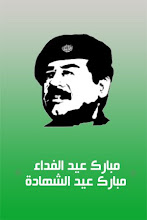Why Elections Won't Quell Iraq Resistance
Published on Wednesday, December 15, 2004 by the Boston Globe
Why Elections Won't Quell Iraq Resistance
by Molly Bingham
The composition of the Iraqi resistance is not what the US administration has been calling it, and the more it is oversimplified the harder it is to explain its complexity.
I spent from August 2003 until June this year in Baghdad researching the resistance. That's obviously not a comprehensive study, but it does provide a more complete picture of the resistance than the administration's. My objective is not to romanticize the fighters or their fight, but merely to better understand what our realistic choices are in Iraq and the Middle East.
Here are some myths about the Iraqi resistance that need to be dispelled.
The resistance only began after months of America "botching" the occupation.
While three of the fighters I spoke to had waited several months to "join" the resistance, the bulk of those involved decided within days of the end of the "ground war" on April 9 that they would fight. Only three had done voluntary military service, and only one of them was still on active military duty.
Of the five fighters I spent the most time with, all of them had begun organizing resistance cells within a week of April 9. They started small with friends. One man, a teacher, had neither been a member of the Ba'ath party nor an admirer of Saddam. He started as a guide for foreign fighters and later looked for a group of like-minded men he could work with. With no military experience, he soon became a weapons procurer for an ever widening group of cells.
The resistance in Iraq is made up of Ba'athi dead enders, regime loyalists, common criminals, Islamic extremists, and driven by a vast number of foreigners with contacts to Al Qaeda.
While there are certainly those elements involved, it is misleading to describe the resistance in those terms. I met no one who had recently been released from prison or who knew of any connections with Al Qaeda, and I only met one foreign fighter. (I would not, however, be surprised if Al Qaeda or other militant Islamic movements have become active in Iraq since I left.) I met Shia and Sunnis fighting together, women and men, young and old. I met people from all economic, social, and educational backgrounds.
The original impetus for almost all of the individuals I spoke to was a nationalistic one -- the desire to defend their country from occupation, not to defend Saddam Hussein or his regime.
However, two things should be noted. First, after the capture of Saddam a year ago, I sensed the growing power of Islam within the fighters. Second, in the absence of a solid government or civil structure it is not surprising that a Muslim community would revert to Koranic law, even if only temporary.
The Iraqi resistance is a monolithic, tightly organized structure with a leadership that can be obliterated and a fixed number of fighters who can be eliminated.
The many levels of violence in Iraq after the US attack on Fallujah last month reveal the absurdity of this myth. Of the 15 resistance members who told me about their lives, most were from the same small neighborhood of Adhamiya in Baghdad, but were not necessarily in the same cell or command structure. By the end of 2003, these cells had grown while maintaining their independence. They were no longer carrying out attacks in their own home turf but were traveling to other areas of the country. The rise in attacks over the past year has been attributed as reactions to the transfer of power to the Allawi government in July 2004, or to the elections in January. However, more likely, it is simply an indication of improved funding, coordination, and resources.
Attacking Fallujah neither decapitated the resistance nor eliminated its support. Rather it is a powerful recruiting poster for Iraqis not yet engaged in the struggle and for foreigners motivated to join what they view as a Jihad.
Nationwide elections will provide Iraq with a legitimate government, and the violence in the country will subside significantly.
The notion that after elections the resistance will have nothing left to fight against is untenable. There is no government that can emerge from the current process that will be viewed as legitimate in their eyes. The resistance will continue until American influence has disappeared from Iraq's political system.
The political dead end described above is the fate the resistance has chosen. They view themselves, and are viewed by others, as Iraqis and Muslims, declaring their fight to be for their homes, their nation, their honor, and their faith against the imposition of a political structure by a foreign nation. Their struggle against us is not much more complicated than that, and it seems to me that the violence will remain until we are gone.
Molly Bingham, a photographer and writer, is a Nieman Fellow at Harvard University.
© 2004 Boston Globe Company
